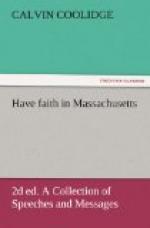DECEMBER 15, 1916
During the past few years we have questioned the soundness of many principles that had for a long time been taken for granted. We have examined the foundations of our institutions of government. We have debated again the theories of the men who wrote the Declaration of Independence, the Constitution of the Nation, and laid down the fundamental law of our own Commonwealth. Along with this examination of our form of government has gone an examination of our social, industrial, and economic system. What is to come out of it all?
In the last fifty years we have had a material prosperity in this country the like of which was never beheld before. A prosperity which not only built up great industries, great transportation systems, great banks and a great commerce, but a prosperity under whose influence arts and sciences, education and charity flourished most abundantly. It was little wonder that men came to think that prosperity was the chief end of man and grew arrogant in the use of its power. It was little wonder that such a misunderstanding arose that one part of the community thought the owners and managers of our great industries were robbers, or that they thought some of the people meant to confiscate all property. It has been a costly investigation, but if we can arrive at a better understanding of our economic and social laws it will be worth all it cost.
As a part of this discussion we have had many attempts at regulation of industrial activity by law. Some of it has proceeded on the theory that if those who enjoyed material prosperity used it for wrong purposes, such prosperity should be limited or abolished. That is as sound as it would be to abolish writing to prevent forgery. We need to keep forever in mind that guilt is personal; if there is to be punishment let it fall on the evil-doer, let us not condemn the instrument. We need power. Is the steam engine too strong? Is electricity too swift? Can any prosperity be too great? Can any instrument of commerce or industry ever be too powerful to serve the public needs? What then of the anti-trust laws? They are sound in theory. Their assemblances of wealth are broken up because they were assembled for an unlawful purpose. It is the purpose that is condemned. You men who represent our industries can see that there is the same right to disperse unlawful assembling of wealth or power that there is to disperse a mob that has met to lynch or riot. But that principle does not denounce town-meetings or prayer-meetings.




